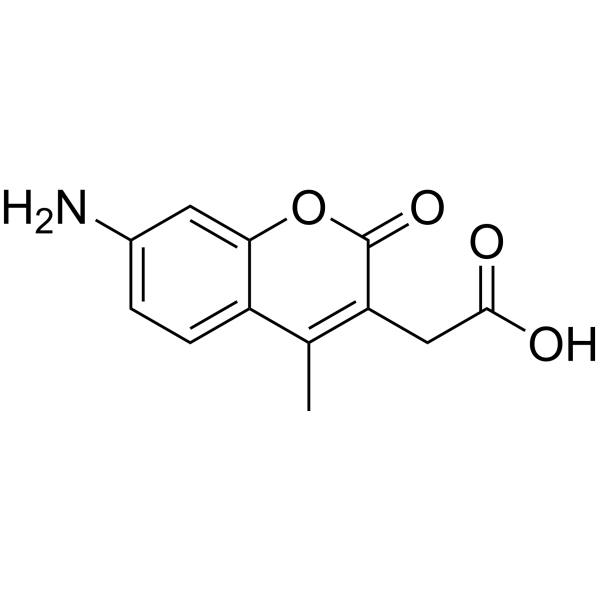
7-Amino-4-methylcoumarin-3-acetic acid
CAS No. 106562-32-7
7-Amino-4-methylcoumarin-3-acetic acid ( 7-Amino-4-methylcoumarin )
产品货号. M29084 CAS No. 106562-32-7
7-Amino-4-methylcoumarin 比 GD(4)K-NA 更适合作为肠肽酶的底物。
纯度: >98% (HPLC)
 COA
COA
 Datasheet
Datasheet
 HNMR
HNMR
 HPLC
HPLC
 MSDS
MSDS
 Handing Instructions
Handing Instructions
| 规格 | 价格/人民币 | 库存 | 数量 |
| 5MG | ¥1077 | 有现货 |


|
| 10MG | ¥1596 | 有现货 |


|
| 25MG | ¥2665 | 有现货 |


|
| 50MG | ¥3961 | 有现货 |


|
| 100MG | ¥5775 | 有现货 |


|
| 200MG | 获取报价 | 有现货 |


|
| 500MG | 获取报价 | 有现货 |


|
| 1G | 获取报价 | 有现货 |


|
生物学信息
-
产品名称7-Amino-4-methylcoumarin-3-acetic acid
-
注意事项本公司产品仅用于科研实验,不得用于人体或动物的临床与诊断
-
产品简述7-Amino-4-methylcoumarin 比 GD(4)K-NA 更适合作为肠肽酶的底物。
-
产品描述7-Amino-4-methylcoumarin is more suitable as a substrate for enteropeptidase than GD(4)K-NA.(In Vitro):In this study, we used shift in the emission spectrum of GD(4)K-conjugated 7-Amino-4-methylcoumarin (GD(4)K-AMC) as a fluorogenic method to measure enteropeptidase activity. The kinetic analysis revealed that enteropeptidase has a K(M) of 0.025 mM and a k(cat) of 65 sec(-1) for 7-Amino-4-methylcoumarin, whereas it has a K(M) of 0.5 to 0.6 mM and a k(cat) of 25 sec(-1) for GD(4)K-NA. The optimum pH of 7-Amino-4-methylcoumarin hydrolysis was pH 8.0.
-
体外实验——
-
体内实验——
-
同义词7-Amino-4-methylcoumarin
-
通路Others
-
靶点Other Targets
-
受体——
-
研究领域——
-
适应症——
化学信息
-
CAS Number106562-32-7
-
分子量233.223
-
分子式C12H11NO4
-
纯度>98% (HPLC)
-
溶解度In Vitro:?DMSO : 125 mg/mL (535.97 mM)
-
SMILESCc1c(CC(O)=O)c(=O)oc2cc(N)ccc12
-
化学全称——
运输与储存
-
储存条件(-20℃)
-
运输条件With Ice Pack
-
稳定性≥ 2 years
参考文献
产品手册




关联产品
-
Boc-NH-PEG12-NH2
Boc-NH-PEG12-NH2 是一种基于 PEG 的 PROTAC 连接子,可用于 PROTAC 的合成。
-
Endothelin-1 (1-15),...
Endothelin-1 (1-15), amide, human
-
Desacylsenegasaponin...
Desacylsenegasaponin B is an active product that can be extracted from root of Polygala tenuifolia. Desacylsenegasaponin B has potential anti-inflammatory activity.



 021-51111890
021-51111890 购物车()
购物车()
 sales@molnova.cn
sales@molnova.cn







